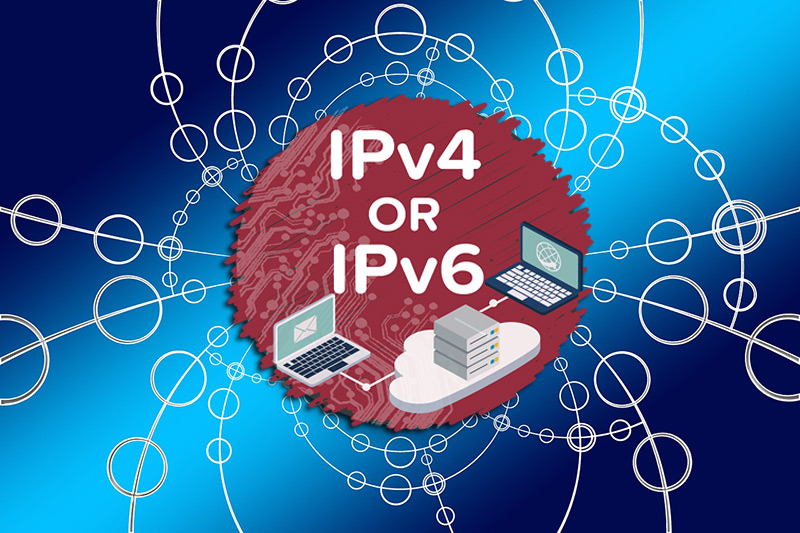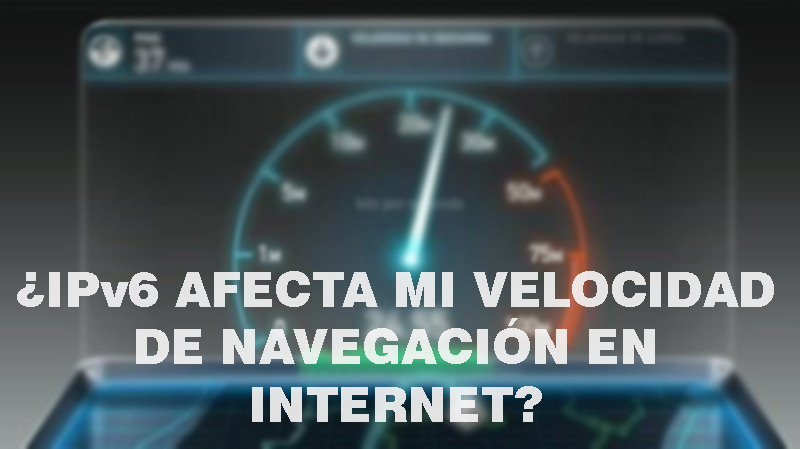
Index:
UPDATED ✅ IPv6 is a version of the IP protocol used to identify computers within a computer network ⭐ ENTER HERE ⭐ Learn more about the subject
The Internet works through protocols which are numerical combinations that establish connections between computers. This means that whenever a user initiates an Internet connection, a large number of numbers and addresses maintain that connection online, and thanks to this it is possible to track them to exchange data with her.
It is no secret to anyone that the generalization of Information and Communication Technologies (ICT), as well as the increase in devices connected to the network; have caused that the implementation of a new protocol for the inner workings of the Internet is necessary. Thus, we refer to the IPv6 protocol that has supplanted IPv4, with which we have worked in recent years.
But well, surely you will ask yourself, what is the famous IPv6 and what is it for? Like its benefits and limitations, so here we will detail everything about it. Also taking into account other parameters of interest such as the main differences with its predecessor.
What is IPv6 and what is it used for in computing? Why has it become so necessary?
It is the abbreviation of the concept in English “Internet Protocol version 6” or the same as “Internet Protocol Version 6” which is an updated version of the old IPv4. That is, the protocol that has been used since the 1980s and allowed both communication and the internal operation of the network. But, since 2011, the IP addresses that he could assign were exhausted.
In this sense, IPv6 was produced from the June 06, 2012, when it was officially launched. However, it is not new because it began to be developed in 1998. Thus, the Internet Protocol in its version 6 marked the beginning of a new internet model that provides a system for identifying and locating computers or devices on networks and, at the same time, routes traffic through the Internet.
Currently, this is the most recent version of the Internet (which is why it is also known as the “Next Generation Internet”) and consists of a set of specifications from the Internet Engineering Task Force. In this way, it serves to identify various devices on the network so that they can be located.
Notably, has expanded capabilities and its growth has allowed the current development to go through more modern large-scale deployments.
Now, you are surely wondering why this new protocol is so necessary today. Given this, we clarify that this is mainly due to the fact that emerges as an optimal response to the disproportionate increase in the number of connections that has occurred in recent times.
Therefore, IPv6 has achieved expand the ability to generate new connectionssignificantly, thus supporting the growth of the network and also excluding the limitations of IPv4 that were already overcome by the generalization of the Internet.
In this way, it has allowed its progress to continue and supports the expectations of such long-term growth, which are focused on the development of the internet of things.
What are the advantages and limitations of version 6 of the IP protocol?

For its part, it is of great importance to know what are the most notable and important advantages and limitations with respect to the latest Internet Protocolthat is, IPv6.
Next, we introduce you to each of them:
Advantage
Since it is the replacement for IPv4 and fully supports the progress of the Internet; of course it is a protocol that reveals a lot of benefits to its users.
Know, here, the most important of them:
- ensures that each person you can have your own addresses for all your devices. Since, the number of IPv6 addresses is so high that up to 670 thousand billion addresses could be granted for each square millimeter of the Earth’s surface.
- Adds in its standard the mechanism “plug and play” and this makes it easy for users to connect their computers to the network. Taking into account that, in this way, the configuration is carried out automatically and with it, it will also be assigned one or more IPv6 addresses to a machine connected to such a network, automatically.
- It includes remarkable security in its specifications, as is the encryption of the information and also the authentication of the sender of that information. In other words, it provides greater privacy.
- enter much more robust and efficient mobility mechanisms. This, apart from benefiting users of telephony and mobile devices, also ensures good Internet connections during plane flights, for example.
- Provides optimized support for new options and additions, allowing for major enhancements in the future. Thanks to the fact that it is clearly designed to be extensible.
- offers an excellent compatibility improvement for quality of service (QoS) and class of service (CoS).
- Contains new protocol for the interaction of neighboring nodes.
Limitations
But, since not everything can be perfect, the IPv6 protocol also has certain drawbacks or limitations that must be known.
Here are the main ones:
- Still, most networks are IPv4 and because of this, the full implementation of IPv6 is considered very expensive and long termas it can take a long time to establish.
- So far, we cannot completely do without the IPv4 protocol. Because there are already many sites on the network that only have access through IPv6 and this means that it will be necessary to work in double stack. That is, both in IPv4 and also in IPv6 simultaneously.
- In this recent protocol there is no NAT or, the mechanism used by IP routers to exchange packets between two networks that assign mutually incompatible addresses.
- Layer 3 devices need to be ready for IPv6. Otherwise, if they only work on IPv4, they would be devices completely obsolete.
- Although the foundations of IPv6 are perfectly well established, it is still considered a protocol that is in some developing details.
- This protocol can be harder to memorize.
IPv6 vs IPv4. How are they different and which is better?
It is also very important to know How is IPv6 different from its predecessor?, that is, from IPv4. To do this, keep in mind what improvements the most recent protocol has brought with respect to the progress of the Internet and at the same time, know which is the best between the two.

Ability to generate new IP addresses
Among all its distinctions, without a doubt, the most important is the one that is also known as “Bit Address Length”. In this sense, the Internet Protocol in its version 4 has managed to transfer addresses to 32 bits (or 4 bytes) with a capacity slightly larger than 4,000 million IPs.
On the other hand, with respect to IPv6, this raises said capacity to 128 bits (or 16 bytes). Which implies the generation of around 340 sextillion new IP addresses. Of course, the difference is abruptly noticeable between both types of protocols.
around security
Another of the most important differences and at the same time, an advantage of IPv6 over its predecessor IPv4 is security. Since, the new Internet Protocol issues greater security and with it, cooperates in favor of the Digital Economy.
In this way, it is opportune to limit that the Internet Protocol version 6 is fully endowed with excellent cybersecurity measures, these being much stronger than those of IPv4. In addition to this, enter the IPSec system which is responsible for shielding your IP address against any attack or unauthorized use.
It should also be noted that, while IPv4 does not provide encryption and authenticationIPv6 does always.
The expansion of all kinds of connected objects
A feature that is fully evident in the IPv6 protocol and not in IPv4, is the expansion of all kinds of connected objects or, the Internet of Things. As well as the development of pillars of digital transformation, such as autonomous vehicles, BiG Data and new telecommunications networks to support the Smart City.
Other relevant differences
IPv4 |
IPv6 |
| admits manual configuration and DHCP addresses | supports automatic configuration and address renumbering |
| Addresses Broadcast | Addresses multicast |
| Address Representation in decimal | Address Representation in hexadecimal |
| Without end-to-end connection integrity capability | Its end-to-end connection integrity capability it is reachable |
Ultimately, it can be stated that IPv6 protocol is the best, compared to IPv4. Thanks to the fact that it shows a greater capacity, more coverage and completely improved features to work for the advancement of the Internet, in general.
Can the version of the IP protocol affect my Internet browsing speed?

It has been estimated that the IPv6 protocol could progressively replace IPv4 and although it involves a large number of changes and improvements in all areas, the first negative result of it has not been long in coming. Which, it has to do with the speed of navigation.
In this sense, when carrying out an analysis of the websites that have adopted this new protocol after their training on the network, it can be seen that said websites are obviously slower than those operating under IPv4. Which means, changing the IP protocol can influence your browsing speed completely.
Thus, according to a latest report issued by a company that makes use of this protocol and whose identity we will not reveal, it announced that the speed of access to addresses with IPv6 is up to 80% slower than the one shown by addresses with version 4 of the Internet protocol. This loss of speed could entail a risk for the user experience and cause notable changes when measuring and monitoring the performance of a website.
Next, We recommend you try our optimal Speed Test in order to verify the speed that your Internet navigation currently shows:
IPv6 test How to know my IPv6 address?
In case you didn’t know, you can already know your IPv6 address from the famous IP test that handle many websites (we recommend you use ours, which you can access from the link that we offer you at the end of the post).
For its part, it should be noted that this type of test works from certain mechanisms that manage to identify your computer in a huge network. This, from an address that is unique, with respect to the rest of the users that manage the Internet and with which, the servers and all the online services know where they should send you the information that you request while browsing any website.
Generally, these IP Test they give you information similar to the one indicated below:
- The complete number of your public IP address.
- The IP geolocation through a map made up of the latitude and longitude coordinates of your area. Including the Postal Code.
- In some cases, they show what is your internet provider or ISP.
Internet